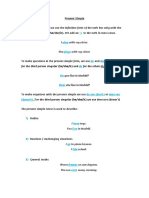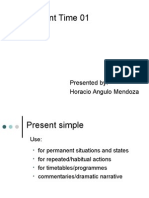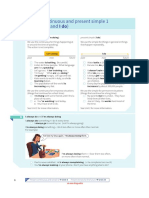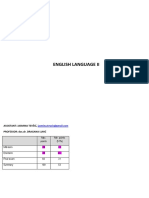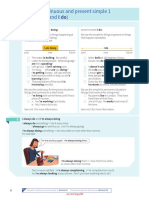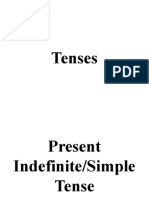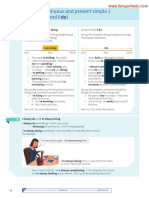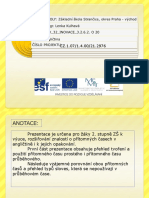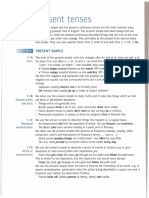0 ratings0% found this document useful (0 votes) 30 views8 pagesPresent Simple Inter
Copyright
© © All Rights Reserved
We take content rights seriously. If you suspect this is your content,
claim it here.
Available Formats
Download as PDF or read online on Scribd
COP
Present simple:
form
Present simple:
meaning
akes\=) al mel pata
Explanations
The present simple is tormed with the bare infinitive form of the verb, We
add s in the third person singular be sheyit
Tike You tthe HeyShe/it kes We tike They tke
Some verbs are irregular: have, be
Thave You have HeShiehas We have They have
Tum Youre HieiSheis Weare They ave
‘a. Spelling problems
Verbs ending in o, s, ft, sh, x add -es for the thied person singular
watches He wishes He relaxes
He goes She misses Si
= Questions
ns are formed with do and the bare infinitive form of the verb,
The third person singular uses does
Do you tike Italian food? Does she Hike Taftan food?
ce, what, why,
Yes/No questi
We also use dovidoes when we form questions with
iow ete
What do you want? Where does she live?
am Negatives
Negatives are formed swith «
fo not and the bare infinitive form of the verb.
‘The third person singular uses does nat.
J do not like tat She docs not like that
In speech and informal writing, do nat becomes don't, and daes not becomes
foes’
Fdlon’t tike thot She doesn’t like that
We use the present simple to describe
Habitual actions,
get up at 7.30,
Actions and situations that are
nerally or usually true
Liz plays in the school basketball
We like ice-cream
Facts which are
The
vays true,
unt riges iar dhe east
he present simple also has some future meanings�INTERMEDIATE LANGUAGE PRACTICE
Present simple:
pronunciation
Present
continuous: form
Present
continuous:
meaning
The present continuaus also has some
Verbs which end in fz, idz/, fst, fshf, fish) and /ks/ make an extra syllable in the
third person, pronounced ra!
Alter fff, #k/, fpf, fe, third person sound is jsf. hits thn
Other third person fs! are pronounced as Jai. sees /si|
Does is normally pronounced fdvz
a The present continuous is formed with the auxiliary verb be and
form of the main verb,
Jam relaxing. You are relaxing, He/She is relaxing.
We are relaxing, They are relaxing
the -ing
a
ing problems
Verbs ending -e drop the -e when they add -ing
like liking decide deciding write writing
Verbs with one syllable, ending in one vowel and one consonant, double the
consonant when they add -ing.
Sif sitting swim swimming — dig. digging
Verbs ending -ie change -ie to -y
lie lying tie tying die dying
= Contractions
In speech and informal writing, the verb be Is contracted:
Fim veriting You're writin He's/She’s writing.
We're writing They're writing
= Questions
Yes/No questions are formed by inverting the subject and the auxiliary be
Am I writing? Are you writing? Is he/she writing?
Are we writing? Are they writing?”
Wi questions follow the same pattern.
What are you writing? Why are we writing?
fm Negatives
Negatives are f
ne
I'm not writing He's not writing, They're not writing.
led with the verb be + not, This is contracted in speech and
informal wri
We use the present continuous to describe
Actions in progress at the present moment
Sorry, F can't speak to you, I'm washing miy hair,
Actions happening ‘around now’, even though not at the moment of
speaking,
I'm reading The Lord of 0
Rings
suture meanings.�GRAMMAR 2 PRESENT TIME 1
1 Underline the correct phrase in each sentence.
turdays?
a) What time go youw/do you go to bed on
by Why are you waitiny/do you waiting outside the door?
©) Don't ask Tim, He doesn’ know/not knows the answer.
Gh) I having/’m having my lunch at the moment.
e) When y
feave the house in the morning?
1) [don’t understand. What is happening/is happen?
ag) Excuse me, does you know/ido you know the time?
hy This is a great party. J’m having/Am I having a lovely time
2 ead the answers and then complete the questions.
a) Where ..daee. Sue. live?.
Sue? She lives at the end of Axwell Rowd
b) Do
Jim? No, I don’t know him
©) What
A
a) Are
e moment? I'm doing my homework.
Here? No, I'm sitting over there
©) Do
Here? No, we change trains at the next station
5 Why
I'm wearing two pullovers because ! feel cold!
3 Rewrite each sentence so that the ver in italics isa negative contraction.
3) Naomm and Bill are watching television,
Naomi and Bill aren't watching tele
ison,
bb) Peter likes chocolate cake.
) or using this pencil at the moment.
a) The children are having lunch in the kitchen
©) I set up early on Saturday.
B Flena is writing a nove�INTERMEDIATE LANGUAGE PRACTICE
6
Compiete each sentence with a present simple or present continuous form, using
the words in bold
a. Do, you. like
you like
b) What ime
the sun rise
What
you read
d) Sorry, Lean't talk
Thave
8) We
not watch videos
1) Look out of the window!
it snow
8) This is an examination! Why
you talk
hy Ann
go
i) Pat has got an interesting hobby:
she build
Choose the correct spelling from each pair of words
2) Gaping
b) dighngagging
€) deiding/decdeing
1) havingihaveing
4) Ivinglieing
veo
i) waitingiwaitting,
x) washeingywashing
niding/rideing
im) flyeing/lying
nj studing/studying
©} goingfgocing
cheese sandwiches?
at the moment?
a bath,
at school
to school by bus every day,
a unifurm at your school?
a boat
gz F
AK�rr
3
Present simple:
frequency adverbs
State verbs and
action verbs
Present timed
Explanations
wm Frequency adver
sare often used with the present sit
ple. They explain
often someone does an action, or something happens,
always Viddd —— Labways get up at 7.00.
often We Pat often goes to football matches
seswally We MH usually rains when I so on holidoy!
sametimes 0 We sometimes eat pizza for lunch
rarely v Jane rarely listens to jazz.
never = My Bus never arrives on time
m= Note in the above examples that the frequency adverb comes before the
verb, With the verb be the adverb comes after.
Jim is usually fate
wm Other frequency adverbs are: fi
(0), selilom (2), hardly ever
wnentiy (STS), normally WV), occasionally
m= A state is when something stays the same, An action is when something.
happens. State verbs are not usually used in any continuous form
T know what you mean, (NOT betaine ee sire rei.
Examples of state verbs are,
senses: appear, hear, Fo0K like, see, tast
= feeling: like, hate, Love, prefer, want, wish
fm thinking: agree, believe, forget, know, think, understand
m possession: belong to, contain, have, own
= being be, exist
@ other ‘st, depend an, mean, need
Some of the verbs in the previous list can have a ‘state’ meaning and an
‘action’ meaning, Examples ineludy be, June, taste, think,
Thave two sister (permanent state
Tm having problems with this computer (temporary ac
Sometimes state verbs can describe temporary feelings,
How are you getting on at your new schol?
TL hratesT'm huating it!�INTERMEDIATE LANGUAGE PRACTICE
Present simple or
continuous?
Present
continuous: future
meanings
Other problems
Compare:
Present simple Present continuous
permane temporary
habits and routines in progress now
facts that are always true events happening at the moment
general situations 2 particular situation
I live in Budapest. (all the time}
I’m living in Budapest. (for a few months}
This plane lands in Frankfurt, (routine)
We're landing fin progress now)
© The present continuous can be used to describe a fixed foture arrangement,
There is usually a future time expression
Paul is leaving early tomorrow morning.
My parents are buying me a mountain bike for my birthday.
This usage Is common when we describe social arrangements.
Are you doing anything on Saturday? We're going skating.
a feel
‘There is almost no difference of meaning between the simple and
continuous,
1 feet awful! I'm feeling afl!
How do you feel now? How are you feeling now?
= Present continuous or present perfect continuous?
Sue is staying with Jill
in progress now, and will continue)
Sue has been staying with Jill since March.
Lin progress up to now, and may or may not continue)
Present continuous wi
We can use always with the present continuous when we are exaggerating or
complaining. We emphasize always in speech in this case,
You're always forgetting your keys!
always
Present simple in narratives
In speech we can use the present simple to make a story or joke appear more
immediate and interesting, even though the events were in the past. This is
also used in written summaries such as plots of television series
A man walks into a bar and asks far a glass of water. The barman says
The story so far: Michael meets Susan in the library and tells her about the
missing earrings�GRAMMAR 3 PRESENT TIME 2
Underline the correct sentence for each situation.
2) You want to invite a friend to your party on Friday. You say
| Thave a party an Friday. Do you want to come?
2 I'm having a party on Friday, Do you want to come?
b) You find a wallet on your desk and ask the people nearby
1 Who does this wallet belong to?
2 Who is this wallet belonging to?
A friend invites you to a snack bar at uneh time. You say
1 Thanks, but | always go home
2. Thanks, but I'm always going home
q
A friend opens the door and says: What are you doing? You reply
1 T work as a secretary.
2 I'm repairing the computer.
©) You haven't decided yet about buying a new bike. You say
1 T think about it
2. I'm thinking about it
fA friend asks: Do you like lemon tea? You reply
1 I prefer tea with milk.
2 I'm preferring tea with nuilk,
4g) A friend asks you if you have finished the book she lent you. You say’
1 Sorry, I still read it,
2 Sorry, I'm still reading it.
bh) I's a hot day, but a friend has @ heavy coat on. You ask:
1 Why de
2. Why are you wearing a heavy coat?
you wear a h
vy coat?
Underline the correct word or phrase in each sentence,
2) That can’t be right! J dow 177 not believing it!
b) Caroline
n't swim today. She has/is having a cold.
} See you in the morning, I
) What
¢} Stop doing that, Rill! You're/You're being very silly
sit in the back with Martin
evening? I'm really hungry
hh) You're a great cook! This cake tastes/is tasting wonderful,
i) Where do y
}) Chemistry is
save/l'm leaving now.
If you drop it, it will explode!
£) I drive/t'm driving! You
8) What do we eat/are we eating
so/are you going? | haven't finished speaking to you!
cd. con
iderstandl/l'm
not underst
ding it�INTERMEDIATE LANGUAGE PRACTICE
la
Put each verb in brackets into the present simple or present continuous.
a) Ugh, don’t show me that picture! I (hate) .... A428,
by Who tyou, go) to the match on Saturday with?
©) In the winter, what (you, wear) ?
6) cant stand horror films. 1 (ink) they're silly!
¢) Diana (not, usually, st) next to Ellen
1) Why (you, took at me like that?
4) Excuse me. (this bus, stop) outside the station?
1) 1 (not take) the bus to school today
Match each sentence (ach) with a suitable response (1-8)
a) What do you usually do on your bitthday? ..1
b) Would you like to meet again on Saturday?
©) What do you usually da when there isan earthquake?
4) Have you finished your homework?
e) What are you doing?
1) What are you doing on Friday?
4) Are you in the scioo! basketball team?
hy What do you do?
1b Thave a party
2 Lie under the table
5. I work in a travel agency”
4Yes, we play every Friday
5m still doing it
6 Ws hot in here. oy opening some windows,
8 I'm having a party
Put each verb in brackets Into the present simple or present continuous
2) What osuall, you, doy a. yeu usually. lo, at the weekend?
b) Don't worry about the cat It only ea once a day
{What's the matte:? Why (you, stare) at me lke that?
© (you, speak) English? 'm looking for a hotel
1) Elena (tay) with me while her house is being
decorated
4) You should go on a diet. (you, put on weight
Wy) tthey, speak) French of German? I can’t tll the
Aiference




